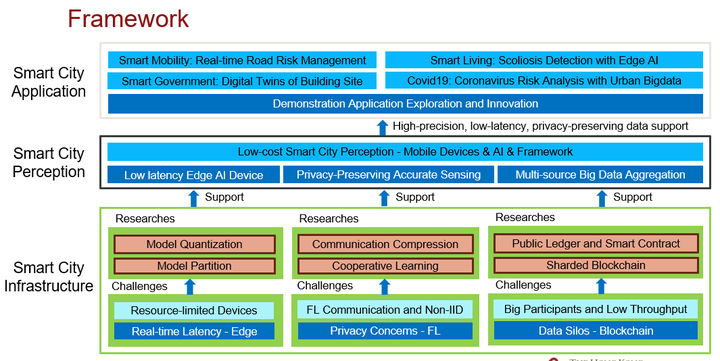Emergency Risk Management in Smart City
 Transform Cities with Smart Technology
Transform Cities with Smart TechnologyWith the emergence and drastic improvement of mobile devices (e.g., phones, tablets, drones, and autonomous vehicles), we are now witnessing an exciting revolution of the digital city. Specifically, with the popularity of 5G networks, video-sharing and live-streaming applications (e.g., TikTok, BIGO, and Twitch) are becoming increasingly widespread. Besides allowing individuals to share life experiences and moments with their followers, video-based applications could also be a promising tool for sensing complex and dynamic urban environments.
With the development of AI-empowered video processing techniques, the ubiquitous mobile camera network has the potential to go beyond the video-surveillance system to capture various risks in the complex and dynamic city environment. However, the edge device has limited computation resource compared to the desktop GPU and CPU, which brings new challenge for optimizing AI algorithm for executing on edge devices.
Another major challenge is the heterogeneous of edge hardware. The AI models need to adapt to heterogeneous edge devices with significant ram and computation difference. The last challenge is view limitation. Since each edge device usually has a small field of view, it is very hard to capture an integrated scenario in the smart city. To support practical real-time risk detection, we must joint use multiple cameras to obtain abundant regional data.
To solve the above challenges, we proposed a crowdsourced mobile video analytics framework for emerging real-time risk management in smart cities. Specifically, our framework consists of three components, including city digital twins, collaborative learning mechanism and real-time risk management.
First, the digital twin is a replica of a physical word, and this pairing of the digital and physical worlds allows analysis of data and monitoring of systems to head off problems before they even occur.
Second, the high-performance collaborative learning mechanism can provide a fast and robust computation capacity to support the real-time requests of the big data analytics in smart cities.
Third, derived from the above two techniques, we develop a real-time risk management platform for proactive risk detection and self-defending emergency response.
The research team will conduct in-depth cooperation with professors from the Department of Real Estate and the Department of Electronic and Information Engineering to promote in-depth research on the security of construction sites based on risk management technology based on edge intelligence.